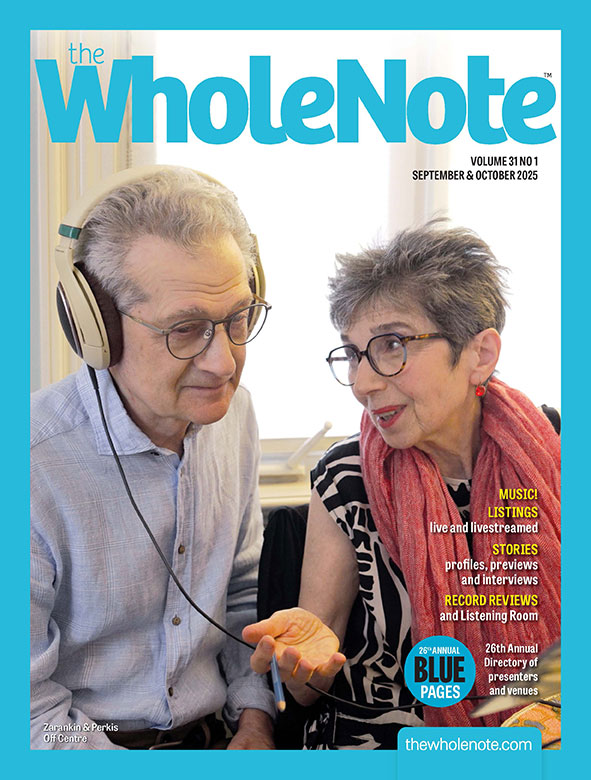Above all else, a disclaimer: The WholeNote attests and affirms that no real clarinet choirs were harmed in the making of the licorice stick joke (page 36, col 1, para 5) in Jim Galloway’s Jazz Notes column this issue. Welcome back, Jim!
Youthanized: It’s amazing how the keepers of various public arts and cultural purses (arts and cultural councils and funds) have the power to send the spirits of their clients and would-be clients soaring to the heights or plunging to the depths. We only qualify for one or two of these, a situation not likely to change unless “survival arts” becomes a discipline like “visual arts” for example. And at the best of times, such as right now, the money that we receive from these sources never exceeds more than five or six percent of what it takes to keep this enterprise swimming doggedly towards the economic safety of some distant (and perhaps imaginary) shore.
Starting with soaring, we are chuffed beyond measure to announce that the Ontario Media Development Corporation has agreed to support our proposal to develop an online “Listening Room” as an adjunct to our DISCoveries CD/Record Review Section. We’ll be tweaking and testing starting this coming month, with a full scale launch in the spring. Stay tuned, And welcome aboard, Thom McKercher, who will be piloting this initiative.
The “sinking feeling” side of things is a little harder to nail down, because it’s not specific to us but rather something that the whole musical milieu we serve is going through to some extent. It is the result of the fact that, despite the emergence of new creative organizations all the time, the governments that supply the aforesaid arts councils and funds with cash are hugely resistant to increasing the amount of money available. The Ontario Arts Council, for one, has had its budgets flatlined for years. So the money available must be shared among more recipients. Older organizations find themselves threatened with “youthanizing” - letters announcing little cuts here and there, and threatening larger cuts unless the organizations in question address themselves to newer or younger or more diverse audiences. Would it not be better to have the resources to fund directly the arts and culture arising organically from these new constituencies as they emerge?
It’s not the fault of the councils and funds. It’s the chronic lack of respect that arts work gets from dumb politicians at every level.
Election reflections, Ontario October 27 2014: Speaking of dumb politicians,make no mistake, there’s no worse feeling after an election than to have voted fearfully (“strategically” it’s sometimes called) for the lesser of two evils. And it’s especially sour when the stratagem fails. That’s what happened in my small town the last time round. The bigger bully got elected anyway, and I had the taste of it in my mouth for a long time.
So this time round I said “strategy be damned” and voted with a hopeful heart. (So how did that work out for you, Dave?)
Well, definitely no sour taste so far; and a bit less fear in the air, because it appears the strategic voters carried the day, even without my help, which is a bit of a blow to the ol’ ego.
Mine is just a small town, mind you, but I suspect that even in what are colloquially referred to as “world class cities” the same dynamic applies: you vote, then wait, en masse, to see who the real beneficiaries of the power you have awarded will be.
Best chat I had along the way during this election campaign, by far, was not with a candidate but with a super-fine young vocalist who showed up at a fundraiser/party for a particularly hopeful mayoralty candidate in the old home town. We chatted away, while an evening’s worth of fine musicians added their musical hearts and skills to the evening’s hopeful hullabaloo.
As is so often the case, the fundraiser fell further and further behind schedule the longer it went, and our conversation had time to wander over the whole range of galas, fundraisers, benefits and the like – events that as you know run the gamut from “pay what you can” to hundreds of dollars a plate; and from spontaneous uprisings, organized at lightning speed in response to calamity, to events planned months in advance with military precision all the way though to huge events.
Where music and musicians fit into such events is as varied as the range and scale of the events. “Sometimes, as in a case like this” my musical companion said, “I am doing it because I would give this candidate money myself if I had money to give. And it’s funny ... I am happier sitting around here waiting my turn even if we are an hour and a half behind, than I would be if the same thing was happening at an event for which I was being paid scale or more and was just part of the decor, arriving and departing through the kitchen door like the rest of the hired help.”
“And somewhere in between,” she said, “there are the events where you know that a lot of the people involved are being paid a standard wage or fee, for the flowers, or the catering, or the invitations, but somehow, as a musician, I’m expected to do my work for free because as an artist I should understand that it’s for a good cause. Or even more grating, that I should be grateful because I am being given the opportunity to perform for a ‘real’ audience.”
It wasn’t an embittered rant; just a bit of gentle back and forth on how it takes all kinds to make a world. And to make the world better.
When my musical companion did finally get up to add her voice to the mix, that election fundraising night at Hugh’s Room, it was as always with all her heart and all her might; all in all the music that night made the club feel like it had rafters, ringing with hope and with laughter.
The point is that when hope needs harvesting, music is often just what is needed to gas the engine and to bring muscle to the mix. In cases like that, who benefits? Everyone.
This issue’s Galas and Fundraisers listings are chock-a-block with events at every scale of ambition and complexity from the simplest to the grandest. But the concert listings too are replete with the same impulse. Scan the concert listings for any week, and see how often a worthwhile cause is named as the beneficiary of a given event, even if it is only to enable the venue to keep the roof over the rafters the music rings round in.
Tributes Abound: Close cousin to the benefit concert, but with a differently generous impulse at its heart is the tribute concert. There are two I want to mention briefly here. One is a Counterpoint Orchestra event in memory of a longtime member, Paul Willis. You can find it November 8 at 7pm in the GTA listings and read a short “remembering” article about him in the previous issue of The WholeNote. The second is a concert in memory of organist Massimo Nosetti, November 12 at 7.30 at St. Paul’s Anglican Church on Bloor Street East (also to be found in the GTA listings). I remember an organ concert Nosetti gave there in 2012, with a 30-piece orchestra.




